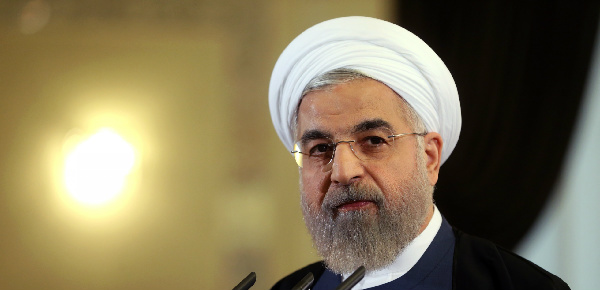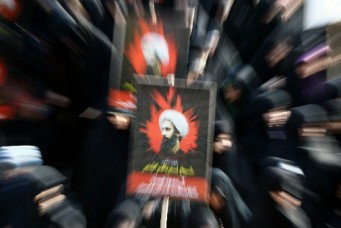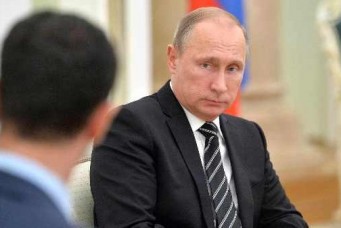Ending the Iranian-Saudi Cold War
A diplomacy deficit between Iran and Saudi Arabia has exacerbated volatility across the Middle East. Ending the Iranian-Saudi cold war, and building a collective security framework for the Middle East is the only option likely to succeed.

Iranian President Hassan Rouhani at a news briefing, Tehran, Iran, April 3, 2015. Ebrahim Noroozi/AP/Corbis
While unprecedented diplomacy has changed the face of United States-Iran relations over the past two years, the opposite has plagued Iranian-Saudi Arabian relations. A diplomacy deficit between the two regional powers has exacerbated volatility across the Middle East. According to a well-connected Gulf Cooperation Council (GCC) analyst, President Barack Obama was frank with his Saudi counterparts on this issue, telling them: “We’re solving our problems with Iran. You should do the same.” Instead, misperceptions about Iran’s regional ambitions and its domestic powerbrokers have caused Riyadh’s leaders to shun regional integration and collective security in favor of unnecessary attempts to counter Iranian power.
To hear some Saudis tell it, relations between Tehran and Riyadh were trouble-free until Shah Mohammad Reza Pahlavi was overthrown in 1979. “After the 1979 revolution, Iran started to interfere in internal Arab affairs of countries around them,” a Saudi official told me at a conference this year. “Before the 1979 revolution, there was no conflict between Sunni and Shia. We want to live in peace and harmony, but Iran will not allow the region to do so.” Putting aside this generous historical interpretation of Iranian-Saudi and Sunni-Shiite relations, Saudi officials routinely emphasize both publicly and privately that Iran should stay out of “Arab affairs.”
This overtly sectarian policy toward Iran (where are the Saudi government protests against Turkey openly intervening in “Arab affairs”?) is at worst racist and at best dishonest. Riyadh’s zero-sum mentality fuels misperceptions that could cause it to miss the best opportunity in over a decade to build durable regional security.
Saudi misperceptions about Iran’s regional ambitions cannot be overstated. “Iran seeks to be a hegemon. This is the real source of instability in the Middle East,” another Saudi official told me. “Iran is trying to occupy Iraq, Syria, Lebanon, Bahrain, and Yemen. If it truly demonstrates its desire for peaceful relations, we will of course reciprocate—but not until it ceases its occupation of Arab lands.” With the possible exception of Israel, no other country in the world shares Saudi Arabia’s extremist reading of Iran’s regional policy.
From Iran’s perspective, it has long suffered from strategic loneliness because it is a majority Shiite, Persian state in a Middle East dominated by Sunnis and Arabs. It has no obvious regional partners or allies. Despite this, Iran is not striving to become a regional power, as Saudi officials suggest—it is a regional power, based on its size, demographics, resources, and culture alone. From monarchist to mullah, decision-makers in Tehran have believed for decades that Iran is first among equals when it comes to regional security issues.
However, Iran has also learned the hard way that neither hard power nor soft power alone can produce regional acceptance of Iranian power. In the 1970s, the shah understood that conventional military superiority and record oil revenues could not establish a sustainable position as a regional powerbroker. Iran also needed its Arab neighbors to accept Iranian power. To that end, he sought legitimacy in the region by either befriending regional governments or seeking to resolve outstanding issues of tension. The shah succeeded up to a point, settling border problems with Saudi Arabia and Iraq, and improving bilateral relations with Egypt after President Anwar Sadat realigned the country with the Western bloc. Yet, he did not fully gain acceptance of Iran’s regional power status because he neglected soft power: bridging the Sunni-Shiite and Persian-Arab divides.
After the revolution in 1979, the Islamic Republic’s leadership recognized the shah’s neglect of soft power and sought to bridge regional divides through political Islam. In doing so, they traded successes and failures with the shah: Iran’s blend of political Islam and anti-imperialism won it valuable support on the Arab street, but simultaneously destroyed relations with many Arab monarchs and strongmen—Saudi Arabia above all else—who feared political Islam more than the shah’s military and economic power. Today, a cornerstone of Iran’s regional power status continues to be its support for Arab and Muslim constituencies that seek to push back against perceived marginalization at home and in the region.
From Palestine to Lebanon, Iraq to Yemen, Iranian support has been directed to ethnic and religious groups whose domestic persecution predates the establishment of an Islamic Republic in Iran. Rather than pushing for an overthrow of the existing political systems in these respective countries, Tehran believes it can achieve its strategic objectives by committing varying degrees of money, weapons, intelligence, and political advice to these communities. Contrary to Saudi assertions, Iranian decision-makers do not need to interfere in “Arab affairs” because they know they can outsource the fight to marginalized constituencies who have self-motivating grievances. As Iran’s allies in these respective countries empower themselves domestically, Tehran’s hand is strengthened as it jockeys with Riyadh over regional power.
Iran’s regional power is already a reality. Saudi Arabia fears that Iran’s reintegration into the global political and economic systems will tip the regional balance of power in Tehran’s favor. “Sunni Arab countries do not want to see the emergence of close relations between the U.S. and Iran,” a Saudi official told me. “Saudi Arabia does not want Iran to become a U.S. ally.”
Saudi misperceptions about Iran’s regional policy powerbrokers are no less pronounced. “Divide and conquer is an Iranian strategic approach, so why should we play into Iran’s hands by trying to improve relations?” another Saudi official told me. It would be useless to talk to President Hassan Rouhani or Foreign Minister Mohammad Javad Zarif, he said, because “they are not the real powerbrokers.” Instead, he believed Qassem Suleimani, head of Iran’s Quds Force, and Supreme Leader Ayatollah Ali Khamenei “wield the real power in Iran.” It is frightening for a regional power and a neighboring country to have such a fundamental misunderstanding of decision-making processes within Iran.
Contrary to Saudi assertions, political power in Iran runs through a complex and multilayered structure. Most decisions are made in conjunction with diverse and sometimes competing power centers. Iran’s Supreme National Security Council (SNSC) is responsible for defining the country’s defense and security policies and priorities. In a 2011 book, President Rouhani explains that key decisions are made in a small circle of SNSC members, including mainly Ayatollah Khamenei and the heads of the three branches of government.
The current secretary of Iran’s SNSC, Admiral Ali Shamkhani, is a former defense minister in the Mohammad Khatami administration, an ethnic Arab, and perhaps most importantly, enjoys the confidence of Ayatollah Khamenei. He was appointed Khamenei’s representative on the SNSC in 2013, which should be noteworthy to Saudi Arabia given his demonstrated regional policy preferences: in 2004, he brokered and implemented a security agreement between Iran and Saudi Arabia, and was awarded the Order of Abdulaziz Al-Saud by the late Saudi King Fahd Abdulaziz Al-Saud—the only Iranian minister to ever receive such an award. At that time, Rouhani was Khamenei’s representative on the SNSC, Zarif was Iran’s ambassador to the United Nations, and Soleimani had held his position as commander of Iran’s Quds Force for approximately six years.
The apex of Iran’s cordial relations with Saudi Arabia came at a time when the same Iranian officials were driving Tehran’s policy a decade ago. And since late 2013, Shamkhani, Khamenei, Rouhani, Zarif, and Soleimani have once again been working together in an effort to improve ties with Iran’s Arab neighbors. For the past two years, Iran has publicly promoted a narrative that its own national security goals require peace and cooperation with regional powers, which in turn requires a certain degree of accommodation between Iran and the West.
From Palestine to Lebanon, Iraq to Yemen, Iran’s philosophy in the region is that everyone should be included in the process. Even in Syria—the one example where Iran is backing the regime rather than a marginalized minority—Iranian decision-makers have long acknowledged the need for political solutions based on negotiated settlements between domestic political actors and regional powers. It is Saudi Arabia that has rejected such negotiations, instead issuing preconditions to diplomacy and preferring to exclude Iran politically, diplomatically, and militarily.
For its part, Iran has tried to repair relations with Saudi Arabia from the outset of Hassan Rouhani’s presidency. One month after taking office, he called for closer Iranian-Saudi ties, hailed the kingdom as a friend and brother, and said improving relations with neighboring countries is a top priority. Last year, Iranian Deputy Foreign Minister Hossein Amir Abdollahian travelled to Saudi Arabia to meet with then-Foreign Minister Saud Al-Faisal. One month later, Zarif took the initiative to visit his Saudi counterpart at the United Nations General Assembly. Zarif again extended an olive branch by traveling to Saudi Arabia for the late King Abdullah Bin Abdulaziz Al-Saud’s funeral. According to two European Union officials, Iran has also tried track-two diplomacy efforts in their respective European capitals but Saudi Arabia is not prepared to take them seriously.
Simply put, Tehran’s efforts to repair relations have not borne fruit because Riyadh does not want them to. In the meantime, Iran is unlikely to impose heavy costs on Saudi Arabia for its policies because Iranian decision-makers believe the Saudis are already paying heavy costs for their own mistakes. If Iran takes action against Saudi Arabia, it will only help justify false arguments against Tehran emanating from Riyadh. Perhaps more importantly, Iran’s regional policy powerbrokers will continue to leave the door open for diplomacy because they know that if Iran’s regional power is not accepted by neighboring countries, Iran cannot guarantee its own security.
Saudi Arabia is correct when it points out that regional stability—elusive over the past four years—requires Riyadh’s participation. If the new cast of Saudi characters running the kingdom believes that stability can be achieved without Iran playing an equal role, they are doomed to repeat the ideological mistakes that plagued the region throughout the 1980s, when Iran sought to export its revolution and Saudi Arabia bankrolled Saddam Hussein’s eight-year war against Iran. With a nuclear deal completed, the time is ripe for Saudi Arabia to find a face-saving way to switch gears and reciprocate Iran’s offers of engagement.
Saudi officials told me that a big overture from Iran could help jumpstart a thaw between Tehran and Riyadh, but when I pressed them for specifics, they reverted back to unrealistic talking points: withdrawing Iranian support for Bashar Al-Assad in Syria as a precondition to, rather than an outcome of, negotiations. A more fruitful approach would be quietly commencing high-level diplomacy between the two countries in an effort to accommodate legitimate Iranian security objectives in return for Iranian policy modifications. Trading concessions of equal value can serve as a force for regional stability by breaking down the hostility and misperceptions that paralyze bilateral relations.
For Riyadh, this would include recognition that: one, neither Saudi Arabia nor global powers can contain Iran indefinitely; and two, it can better influence Iran by helping integrate the Islamic Republic into the region’s political and economic structures rather than trying to keep it out. Adopting a policy of integration would better reflect the region’s natural balance, which in turn would make it more stable. Saudi Arabia’s current winner-take-all approach has left it in a weaker position, while its policy of détente changed Iran’s pattern of conduct as recently as 2004. There’s no reason to believe that it will produce different results today.
For its part, Tehran must alleviate Saudi concerns by detailing how its regional ambitions do not, and will not, outstrip its post-sanctions role and resources. Iran should also detail steps to reduce its use of asymmetric warfare as a political tool in the region as Saudi Arabia takes steps to reintegrate the Islamic Republic. Together, these measures will demonstrate Tehran’s commitment to being a regional power that is a force for stability and collective security.
This approach was advocated by Saudi Arabia as recently as 2004. At the Manama Dialogue in Bahrain, Saud Al-Faisal announced “an urgent need for a collective effort aimed at developing a new and more solid framework for Gulf security.” He went on to say: “A regional security framework that includes all the countries of the region is the best guarantee for peace and stability in the Gulf. Such a framework should be based on four pillars: the GCC, Yemen, Iraq, and Iran.” He continued, “Iran should play a vital role in maintaining the security of the region. To do so our Iranian friends need to come to terms with the requirements of developing high levels of political, economic, cultural, and security cooperation with their neighbors based on common interests and the mutual refrain from interference in the domestic affairs of others.”
The Iran that Saud Al-Faisal was describing eleven years ago is the Iran of today. Second chances don’t come often. Ending the Iranian-Saudi cold war, and building a collective security framework for the Middle East—one in which security is built and sustained together rather than at the expense of one another—is the only option that has not truly been tried. It is also the option most likely to succeed.
(Author’s note: The conference was held under the Chatham House Rule, which requires that identities of speakers not be revealed. Accordingly, I have not identified speakers by name in this article.)
A version of this article originally appeared on June 17, 2015.
Reza Marashi is research director at the National Iranian American Council in Washington, DC. He previously served in the Office of Iranian Affairs at the U.S. Department of State. His articles have appeared in the New York Times, Foreign Policy, Atlantic, and National Interest. On Twitter: @rezamarashi.



